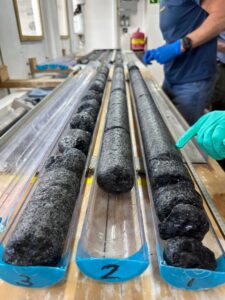
Processing Microbiology Samples Onboard
A unique part of expedition 399 is the astrobiology component – what are some of the processes that could be occurring on moons or other planets that could be responsible for producing life?
 The microbio samples then get smashed into pieces in the geochemistry/microbiology lab on the ship. The team of microbiologists carefully chisels the outside portions of the rock to ensure there is no contamination. The clean interior pieces of rock are then crushed into powders that can be used in shipboard analyses to study everything from proteins to DNA in order to determine the presence or ability to support life.
The microbio samples then get smashed into pieces in the geochemistry/microbiology lab on the ship. The team of microbiologists carefully chisels the outside portions of the rock to ensure there is no contamination. The clean interior pieces of rock are then crushed into powders that can be used in shipboard analyses to study everything from proteins to DNA in order to determine the presence or ability to support life.

 The microbio samples then get smashed into pieces in the geochemistry/microbiology lab on the ship. The team of microbiologists carefully chisels the outside portions of the rock to ensure there is no contamination. These small pieces of rock are crushed into powders that can be used in shipboard analyses to study everything from proteins to DNA in order to determine the presence or ability to support life.
The microbio samples then get smashed into pieces in the geochemistry/microbiology lab on the ship. The team of microbiologists carefully chisels the outside portions of the rock to ensure there is no contamination. These small pieces of rock are crushed into powders that can be used in shipboard analyses to study everything from proteins to DNA in order to determine the presence or ability to support life.
 Fengping Wang, one of the microbiologists onboard, creates cultures in the anoxic chamber where all oxygen is removed because it is toxic to the microbes that thrive below the sea floor. She will grow the cultures over time and analyze the growth rates focusing on several target microbes adapted to high pressure.
Fengping Wang, one of the microbiologists onboard, creates cultures in the anoxic chamber where all oxygen is removed because it is toxic to the microbes that thrive below the sea floor. She will grow the cultures over time and analyze the growth rates focusing on several target microbes adapted to high pressure.
This is the freshest and most complete record of mantle ever collected by ocean drilling. Microbiologists have already detected highly elevated concentrations of molecular hydrogen in borehole fluids, recording active serpentinization. The changing hydrothermal alteration of mantle rocks with depth, creates an opportunity to reconstruct the serpentinization process, including the formation of molecular hydrogen and abiotic synthesis of organic compounds. This will give scientists a clearer understanding of the processes that could be creating the habitat for the origin of life.